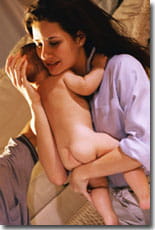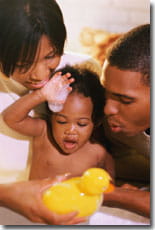Caring For Your Baby at Home
 Holding your Baby
Holding your Baby
Your newborn's neck is not yet strong enough to support its heavy head. When holding your child, make sure to use the palm of your hand on the baby's neck and back. Cradle the head with your fingers.
Umbilical Cord Care
Your baby’s umbilical cord stump should fall off a few weeks after birth. Until then, keep it clean and dry. Make sure to tuck diapers below the cord to avoid irritation. You may also dip a cotton swab in rubbing alcohol and gently clean the area where cord and belly meet. If you see pus or redness or the baby cries when you touch the area, call your baby's doctor.
Diapering your Baby
Every time you change the baby’s diaper, make sure to clean the area with diaper wipes or plain water on a soft cloth for sensitive skin and newborns. Take extra care with creases and folds. Wipe girls front to back to avoid infection. Use ointments only in the event of a diaper rash. Avoid talcum powder as it can irritate the baby's lungs.

Bathing your Baby
Use only mild baby soaps and shampoos on your newborn. A bath every two to three days is plenty if you keep the diaper area clean. Sponge baths are best until your baby's belly button heals. Wash off soap with plain water.
Later, you can bath your baby in a small plastic tub or the sink. Line it with a sponge or towel to make it less slippery and use just a few inches of warm water. Put soap, a container of clean, warm rinse water, washcloth, and towel in reach. Gently wash the face first with plain water, then use a soapy washcloth or your hand on body.
Make sure to wash the diaper area last. Rinse with clean water then wrap your baby in a towel and pat dry.
To wash your baby's head, wet it a bit and wash with a tiny amount of baby shampoo. Tip her head back and gently pour clean water over the hair to avoid soapy water running into her eyes.
Soothing a Crying Baby
Babies cry when they are hungry, need their diaper changed, want to be cuddled or calmed, or when they aren’t feeling well. If your newborn can't be soothed and passes gas often, this could be a sign of colic.
To calm a crying baby, try playing soft music and walking, rocking or holding your baby. Car rides and soft, consistent noises like water running or a vacuum cleaner may also soothe an upset baby.
Sleeping
Newborns sleep about 16 hours a day, usually three to four hour stretches between meals. As babies grow older, they're awake for longer periods of time during the day, and will wake less often during the night. A song, nursing or a bottle and a book read at the same time each night will help settle your baby for sleep.
When Your Baby is Sick
As babies get older, their bodies are better able to fight off illnesses. A low fever in a newborn may be more serious than a higher fever in a 7-month-old. At any age, always call your baby's doctor for advice if a sick baby seems very sleepy, doesn't want to play or eat, or can't be comforted.
